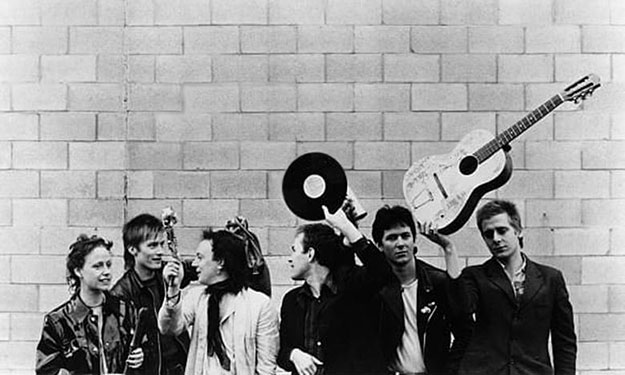Welcome to another edition of Three Easy Pieces, where I look at a pocket of pop culture and see how it's developed, from its birth to today. This month, I'm once again dipping my toes into the murky waters of music subgenres, and this time I'm talking about alt-country. As the name might suggest, alt-country simply signals that a band or artist is taking the essential form of country music and veering away from tradition, whether that means subverting the messaging common in country music, incorporating elements from other genres, or otherwise corrupting the DNA of country. Though the term "alt-country" was coined in the ‘90s, it has been retroactively applied to artists from decades before.
 BIRTH: The Mekons
BIRTH: The Mekons
Honorable mention: Emmylou Harris, Lyle Lovett, Steve Earle, Townes Van Zandt
In what is surely a highly subjective and controversial declaration, the Mekons have been credited with being the first alt-country band. I think it's safe to say that artists like Townes Van Zandt, Emmylou Harris and others might have a greater stake to that claim, but there is something to the argument for the Mekons' 1985 album Fear and Whiskey being the beginning of what we know today to be alt-country.
The English punk band released Fear and Whiskey at the height of Thatcherism and Reaganomics. Though country had long been associated with conservatism, the Mekons co-opted that sound, mixing it with bits of punk and New Wave, and used it to sing songs railing against capitalism and greed. Just the act of taking country music and molding it to their worldview was a political statement, but even with all of that inherent conflict swirling around, Fear and Whiskey is a frankly invigorating and riotously fun album. The Mekons even end the album with a cover of Hank Williams' "Lost Highway," waltzing off into the sunset on an ingeniously inebriated mic drop.
DEVELOPMENT: Lambchop
Honorable mention: Bonnie "Prince" Billy, Drive-By Truckers, Neko Case, Silver Jews, Uncle Tupelo
Lambchop took the omnivorous genre-blending of the Mekons and brought it straight to Nashville, where it could further mutate into something resembling the country version of art-rock. Led by Kurt Wagner's distinctive voice and simultaneously hilarious and poetic lyrics, Lambchop has done its share of morphing over the years. With their roots in country, they've introduced streaks of chamber pop, soul, post-rock, slowcore, and lounge, and always with an ever-rotating cast of top-notch musicians.
It's hard to overstate how completely Lambchop nails the high-wire act they've created for themselves when it comes to balancing the silly and the beautiful. Consider that they released an album in 1997 called Thriller, of all things, and that it opens with a song called "My Face Your Ass." Now, consider that the chorus of "My Face Your Ass" is, "I'll show your punk rock ass," and that the song is absolutely gorgeous. Lambchop might not be as well-known as some of the other acts that have been highlighted in the article, but for those in the know, they're some of the most creative and unpredictable out there.
TODAY: Lydia Loveless
Honorable mention: Angel Olsen, Blitzen Trapper, Jason Isbell, Phosphorescent, The Devil Makes Three
Lydia Loveless came by country honestly, having been raised by a pastor who owned a honky-tonk bar. The difference, though, is that she grew up at a time when alt-country was truly hitting its stride, with any number of bands out there mixing punk and country into a rowdy concoction that's hard to resist. In a different life, Lydia Loveless' voice, slightly ragged and with a touch of a twang, could've easily fit into the landscape of mainstream country, but she has shown herself to be an artist with greater ambitions than that.
After a 2010 debut turned out to be poppier than she liked, Loveless went about redefining her sound, coming out with three subsequent LPs that showcased her authorial voice in a much more direct and rough-hewn way: dark, funny, and with a penchant for subversive subjects (her song, "Lover's Spat," is an upbeat number about Jeffrey Dahmer), and off-kilter love songs, Loveless established herself as an impeccable storyteller with a hell of a knack for melody.
Three Easy Pieces will return, next month, with: The Razzies Get It Wrong.




Read Comments